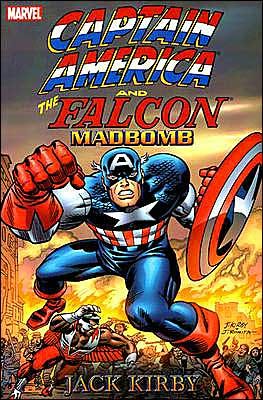
Yes, I know what I said. It wasn't a lie, it was just wrong: an important distinction, although largely a semantic one. When I wrote that the next book I'd review would be The Manticore, I really did think that would be the case (thus, I wasn't lying). When I decided to start reading Jack Kirby's Captain American and the Falcon: Madbomb at dinner, however, plans changed. I was drawn in as I began to pick up on the particularly Kirbyish details of his artwork (I just finished reading some of his original New Gods work [which I think would've benefited {the act of reading it, I mean} from my actually having opened The Hero With 10,000 Faces one of the, well, 10,000 times I've considered doing so], and recognized his penchant for rod-shaped weapons and a particular type of technological design that appears to consist largely of round shapes connected by thin lines...difficult to describe, but read/look at a little Kirby, and you'll get what I mean), and stayed when I realized how unusual this story was going to turn out to be. The "madbomb," you see, is just that: a bomb, that makes people insane (very comic book). And it's set to go off, in Philadelphia, on July 4, 1976 (coincidentally, the same date the final issue in this series was published, celebrating the U.S. bicentennial). Who's behind this plot? Well, to be honest, it seems a lot like it might be the 2009 House Republicans--only in the book, they call themselves the Royalist Army of America (or something like that), and are plotting to overthrow democracy and replace it with a system whereby a chosen elite tell everybody what to do and social order is maintained through the exploitation of human greed. You know, exactly the sort of thing free marketeers are always trumpeting as the solution to all our problems. Well, Captain American isn't having any of it--and neither is his pal, The Falcon, a bitter African-American hero who finds the whole idea of a bicentennial a little trite, given that his family was, well, still enslaved when we white folk "introduced" this whole "freedom" deal to the world (the best part about Madbomb, I think, is that Kirby tries not to gloss over this: the comic's still very much all-American, but it's the kind of all-American that says, yeah, we've really made some pretty big mistakes, and are still working on ironing out their repurcussions, but aren't perfect yet by any means. Because otherwise, this would've just been a sickening exercise in nationalism). Even a marginally-realistic depiction of racial tensions, however, can't quite save this comic from seeming, well, a little bit dated. But is it still a fun read? Oh, yes, it's definitely a fun read. So give it a solid B-, and have done with it.



No comments:
Post a Comment